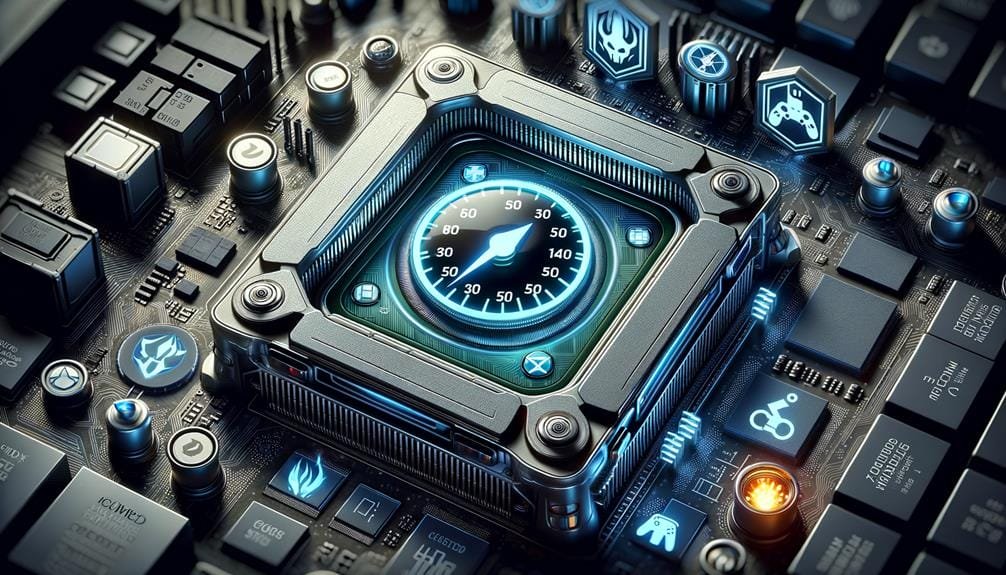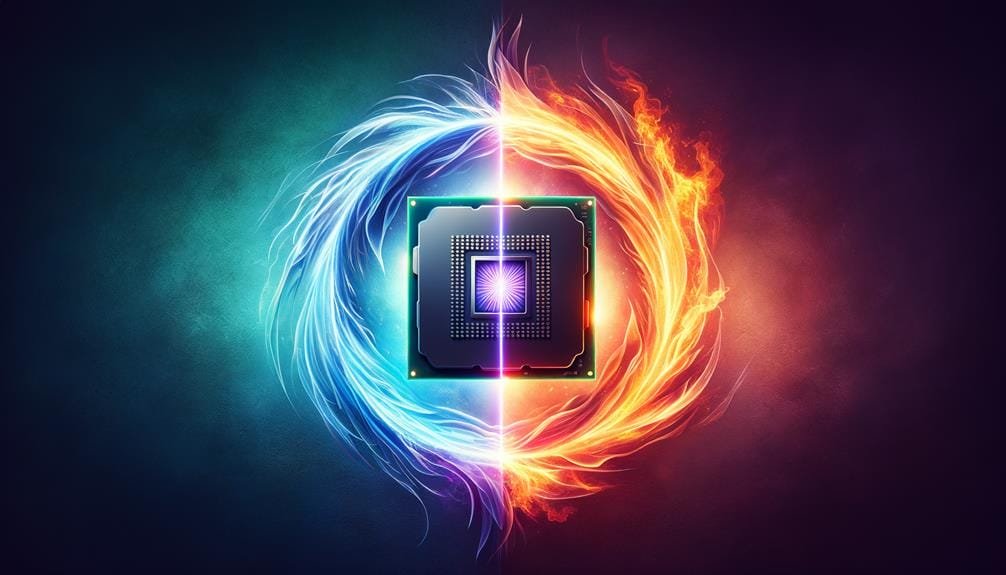Our Newsletter
Sign up for our e-mail newsletter and stay informed for what’s next on the horizon.
Suppose you have resolved to assemble your dream gaming PC. You’ve put resources into a high-grade graphics card, a clear, fast-reacting monitor, and even a gaming seat that could serve as a control center. But what about the core of your gaming setup, the central processing unit (CPU)?
It’s simple to get overwhelmed in the ocean of tech specs and advertising buzzwords, but fret not. We’re here to simplify the 7 top recommendations for selecting the finest gaming CPU, and by the end of this talk, you’ll have the wisdom to make an educated choice.
But why is the CPU so vital in gaming, you might ask? Well, stick with us to learn more.
Fundamentally, in our quest for the ideal gaming CPU, several factors come into play.
We need to look at the number of cores and their speed, the cache size, the cost, and naturally, the perpetual debate: Intel or AMD?
Overclocking should not be overlooked either. The goal is to strike an optimal balance among these elements.
By understanding the basics and scrutinizing the technical specifics, we are able to make informed, strategic decisions and select a CPU that truly enhances our gaming experience.
To fully comprehend the intricacies of selecting the top gaming CPU, we must first decode the basics of a CPU, the electronic circuitry that processes instructions from programs and additional components, powering the operation of devices like PCs, laptops, and smart devices. For gaming, the CPU’s performance has a significant impact on the overall experience.
The number of cores and threads are key in a gaming CPU. More cores cater to improved multitasking, while threads specify the tasks each core can conduct at the same time. The clock speed, quantified in GHz, reveals the pace at which your gaming processor functions. Higher clock speeds usually result in better performance, but also raise heat production and power use, denoted by the TDP.
Certain CPUs come with integrated graphics. While these aren’t optimal for intense gaming, they can manage regular graphical demands. Overclocking, if feasible, can augment your CPU’s clock speed, potentially enhancing gaming performance.
Lastly, the task of picking the best CPU for gaming generally comes down to a choice between an Intel or AMD processor. Both provide competitive alternatives, meaning you’ll have to weigh factors like value, cost, and particular gaming needs. Bear in mind that the top CPUs for gaming achieve a good balance of all these facets.
Probing into the essence of a CPU’s strength, it’s imperative to recognize how the core count markedly dictates the overall performance, particularly in gaming and multitasking situations. The count of cores in a CPU directly affects its capability to manage multiple tasks at once, making the significance of CPU cores crucial in selecting the top gaming CPU.
An increased count of CPU cores facilitates superior multitasking, an essential feature for gamers who stream, document, or operate several programs while gaming. Even if not all games exploit all cores, possessing additional cores supplies a buffer for these extra tasks, improving the overall gaming performance.
Nonetheless, it’s not solely about the count of cores. The equilibrium between core count and clock speed is also critical. In simple terms, more cores can effectively manage heavier workloads, making them an ideal selection for a gaming CPU. However, without sufficient clock speed, these cores may not function at their best.

Let’s unravel the notion of clock speed.
Essentially, it signifies the quantity of cycles a CPU can complete in a second, typically represented in gigahertz (GHz).
It’s key to keep in mind that, even though a greater clock speed might suggest superior performance, it’s not the sole determinant of a CPU’s comprehensive efficiency, particularly in gaming scenarios.
So, how can one define clock speed in the context of CPUs? It’s the rate at which a CPU can complete cycles per second, usually expressed in gigahertz (GHz). A superior clock speed translates to improved performance, especially for tasks that utilize a single thread. However, one must keep in mind that clock speed is only a single component of the entire equation.
You should not overly focus on clock speeds. Other key factors such as core count and architecture are equally important. Different microarchitectures can have a different impact on performance despite having the same clock rate.
| Clock Speed | Significance |
|---|---|
| Higher clock | Quicker processing |
| Quantified in GHz | Accepted technical measure |
| Not the only determinant | Flexibility in selection |
Why does clock speed matter, you might inquire? It’s comparable to the RPM of a car engine – vital for performance, but not the sole factor to consider. When picking the most suitable gaming CPU, you’ll need to evaluate more than just clock speed.
In the gaming industry, the cache capacity of a processor is crucial in determining performance. The function of cache in gaming is to keep often-used data close to the CPU, minimizing the time required to retrieve this data, and thus enhancing gaming performance. For gaming tasks, a bigger cache is typically more beneficial.
The L3 cache is particularly important in PC gaming and gaming laptops. It is the largest cache and is situated nearest to the CPU core. The L3 cache can improve the experience of playing games with a high refresh rate, where swift data access is vital.
Consider, for example, AMD Gaming processors, which are known for their larger cache sizes. This cache size ensures superior performance, especially in intense, quick-paced gaming situations.
Here is a straightforward table for illustration:
| Processor Type | L3 Cache Size | Suitable For |
|---|---|---|
| AMD Ryzen 5 | 32MB | Mid-range gaming |
| AMD Ryzen 7 | 64MB | High-end gaming |
| AMD Ryzen 9 | 64MB | Professional gaming |

In the matter of selecting between Intel and AMD for your gaming CPU, many variables come into play.
We’ll begin by assessing the capabilities of each, focusing on aspects such as cores, threads, clock rates, and built-in GPUs.
Following that, we’ll scrutinize the cost and worth that each brand provides, aiming to assist you in making a more knowledgeable choice.
Let’s delve into the comprehensive comparison of Intel and AMD CPUs for gaming, considering factors such as core count, clock speed, cache size, multitasking capabilities, and cost.
Both Intel and AMD present high-performance solutions for contemporary gaming. Intel CPUs often exhibit greater clock speeds and less power usage, resulting in a seamless gaming experience, particularly in single-threaded games. Conversely, AMD CPUs stand out in multitasking scenarios due to their superior core counts.
When deciding on the ideal gaming CPU, take into account:
In the performance face-off: Intel vs AMD, there isn’t a definitive victor. The goal is to identify the most suitable processor for your distinct gaming requirements.
After assessing the performance abilities of both Intel and AMD CPUs, we now focus on another significant factor – the monetary and value considerations in making your decision.
Selecting the best gaming CPU involves finding a balance between price and performance. When in the market for a new CPU for your gaming setup, you’ll encounter options such as AMD’s Ryzen series and Intel’s Core i5-13600K, Core i7-13700K, and Core i9-13900K.
Your choice in buying a potent processor shouldn’t solely depend on the initial expense. Take into account the ratio of performance to dollar, potential upgrades, compatibility, and sustained value.
In the category of Best Budget CPUs, AMD’s Ryzen often excels. Stay updated on market trends and bundle offers for the most economical option.
Choosing a gaming CPU within a specific budget involves finding a compromise between immediate performance requirements and future upgrade options. It’s crucial to think about potential cost reductions as chip prices decrease over time, as well as future upgrade expenses. Our purchasing guide is designed to assist you in selecting a CPU that satisfies both your performance expectations and budget limitations.
Considering the type of gaming you’ll be engaging in, it’s a good idea to invest in a moderately fast CPU that can accommodate future GPU upgrades. Manufacturers such as Intel and AMD provide a range of choices, including the budget-friendly AMD Ryzen 5 or Intel’s i5 processor.
Here are several key points to keep in mind:

When analyzing the performance and cost parameters of a gaming CPU, one crucial detail to mull over is the potential for overclocking. Simply put, overclocking is the act of setting your CPU or Graphics Processing Unit (GPU) to operate at speeds exceeding its default speed. This practice can maximize your PC’s output, especially for gaming purposes.
Nevertheless, overclocking isn’t suitable for everyone. It escalates power usage and creates more heat, requiring a high-quality CPU cooling system. Additionally, not all CPUs are designed for overclocking, such as the Ryzen series with a non-X or non-K suffix in their model number. These CPUs have fixed multipliers, restricting the ability to modify their clock speed.
If you’re contemplating overclocking, search for a CPU with unsealed cores. The ideal gaming CPU for overclocking would be one with a large number of cores, like the Ryzen 9 5950X, which has 16 cores. However, keep in mind that overclocking may shorten the lifespan of your CPU core. Therefore, it’s a balancing act between immediate performance and the durability of your CPU.
Examining these aspects should assist you in determining if overclocking your gaming CPU is a beneficial endeavor.
Beyond the core count and clock speed, there are more CPU features you should pay attention to.
Overclocking, for instance, can boost your CPU’s speed beyond its factory settings – a boon for hardcore gamers.
Integrated graphics, on the other hand, can be a lifesaver when you’re troubleshooting issues with your GPU.
In addition to core count and clock speed, you’ll also want to consider features such as overclocking and integrated graphics when choosing your gaming CPU.
Overclocking boosts your CPU’s speed for better performance, especially in high-end games. But remember, it needs a compatible motherboard and an effective cooling solution to prevent overheating.
Integrated graphics, on the other hand, allow your CPU to run graphics without a separate GPU. This provides a safety net when troubleshooting GPU issues and reduces heat and power usage. While integrated graphics handle standard graphical demands, a dedicated graphics card is advised for high-end gaming.
Taking these features into account when selecting a gaming CPU will help tailor your gaming experience to your preferences.
Selecting the best gaming CPU is a pivotal decision for any gamer. This choice influences not just performance, but also how future-proof your gaming setup will be. Let’s examine some top CPUs in detail, comparing their features to help you make an informed decision.
For those seeking the pinnacle of gaming performance, the Intel Core i9-14900K is a strong contender for the title of the best gaming CPU. Boasting a remarkable clock speed of 6.0 GHz, it’s designed for ultra-high-performance gaming. But, with great power comes a higher price tag. Is this a sensible investment for your gaming needs, or could a less expensive CPU meet your requirements?
In the arena of top gaming CPUs, AMD’s Ryzen 9 7950X stands tall. With a clock speed close to the i9, it challenges Intel’s dominance. This CPU is a viable option for gamers who seek high performance but are open to alternatives to Intel. However, is the performance difference significant enough to sway your choice?
AMD’s Ryzen 7 7800X3D, featuring unique 3D V-Cache technology, offers enhanced gaming performance. This technology is a game-changer, potentially making it the best gaming CPU for those who prioritize innovation alongside cost-effectiveness. But, does this innovation translate to noticeable improvements in actual gaming scenarios?
A consistent top seller, the Ryzen 7 5800X3D, offers a compelling mix of performance and affordability. Its popularity underlines its status as a potentially best gaming CPU for budget-conscious gamers who don’t want to compromise too much on performance. But, how does it truly stack up against its more expensive counterparts?
| CPU Model | Clock Speed | Core/Thread Count | TDP | Price |
|---|---|---|---|---|
| Intel Core i9-14900K | 6.0 GHz | 16/32 | 125W | High |
| AMD Ryzen 9 7950X | 4.5 GHz | 16/32 | 170W | High |
| Ryzen 7 7800X3D | 3.7 GHz | 8/16 | 105W | Medium |
| Ryzen 7 5800X3D | 3.8 GHz | 8/16 | 105W | Medium |
In your quest for the best gaming CPU, consider how each of these options aligns with your gaming habits, performance expectations, and budget. While each of these CPUs has its merits, the best choice is ultimately one that balances performance with your specific gaming needs and budget constraints. Remember, the most expensive or the fastest CPU isn’t always the best gaming CPU for everyone. Your gaming experience depends on a well-rounded system where the CPU complements other components effectively.
So, what should you consider before finally deciding on the best gaming CPU to purchase? Well, your final considerations before purchase should incorporate a detailed assessment of your personal needs, the CPU’s specs, and your budget.
You’ve got to identify what you need. Is it just for gaming, or will you be doing heavy video editing or streaming as well? Knowing this can help you pinpoint the best gaming CPU for your use. For gaming, a CPU with a high clock speed and a reasonable core count like the Intel Core or AMD Ryzen series, could be ideal.
Now, don’t forget to consider the specifications. Look at the core count for multitasking efficiency and clock speed for faster processing. Check the thermal design power (TDP) to ensure better efficiency and lower power consumption. Evaluate the integrated GPU and the overclocking capabilities.
Lastly, consider your price point. While the best gaming CPUs often come with a hefty price tag, there are budget-friendly options that don’t compromise on performance. Remember, it’s about getting the most bang for your buck.
In essence, when we’re searching for the ultimate gaming CPU, we must consider various aspects.
Core count and clock rate, cache size and price, and of course, the ongoing discussion: Intel or AMD?
We also can’t forget about overclocking. It’s about finding the perfect equilibrium among these components.
By grasping the fundamentals and examining the tech details closely, we can make educated, tactical choices and pick a CPU that genuinely improves our gaming experience.
We’re weighing up the pros of overclocking, considering our budget, future-proofing needs, Intel versus AMD, the role of multicore, cooling solutions, the effect of different game genres, power usage, socket compatibility, and gaming CPU manufacturers to decide on our ideal gaming CPU.
The pivotal aspect of a gaming CPU is a harmony between clock speed and core count. Concurrently, thermal architecture, potential for overclocking, and cache storage play a substantial role in influencing performance.
There isn’t a single ‘optimum’ CPU speed for gaming. The key is to balance the significance of clock speed, multicore effectiveness, and the influence of cache memory. Insights into overclocking, power usage, and strategies for future-proofing also have fundamental roles.
It’s critical to take into account GPU compatibility, prevent CPU throttling, and evaluate the advantages of overclocking. It’s also important to consider thermal design, power usage, processor design, significance of multithreading, and the relevance of the core count. It’s helpful to review gaming performance metrics and the longevity of CPUs.
Sign up for our e-mail newsletter and stay informed for what’s next on the horizon.